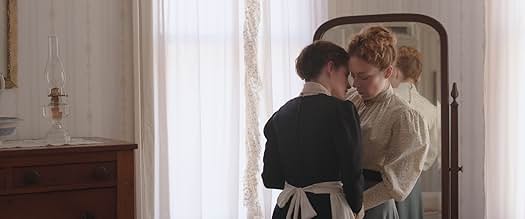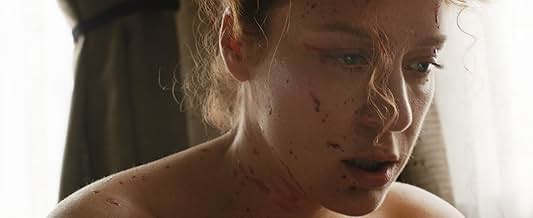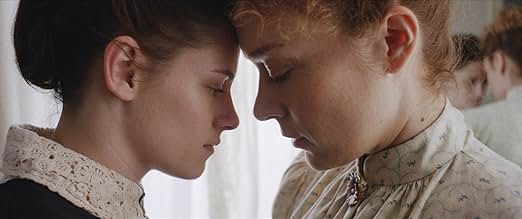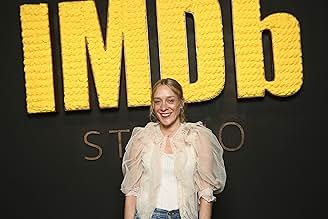PUNTUACIÓN EN IMDb
5,9/10
10 mil
TU PUNTUACIÓN
Un thriller psicológico basado en los famosos asesinatos de la familia Borden en 1892.Un thriller psicológico basado en los famosos asesinatos de la familia Borden en 1892.Un thriller psicológico basado en los famosos asesinatos de la familia Borden en 1892.
- Dirección
- Guión
- Reparto principal
- Premios
- 1 nominación en total
Reseñas destacadas
"Lizzie" chronicles one of America's most famous crimes-the hatchet murders of prominent Massachusetts businessman Andrew Borden and his wife, Abby. The suspect? His spinster daughter, Lizzie, whose name has gone down in infamy.
Originally a passion project for star Chloë Sevigny, around whom talk has circled for nearly a decade regarding a Lizzie Borden biopic/miniseries, "Lizzie" is a well-made psychological drama that will likely satisfy as many people as it will utterly alienate. The screenplay here, as with any kind of historical fiction, takes liberties and makes speculations, the most singular being that Lizzie committed the murders after her father uncovered a romantic relationship between her and the Bordens' house servant, an Irish immigrant named Bridget Sullivan. While this is obviously speculative, when one actually sits and considers the written accounts and evidence, it is not necessarily unlikely, and is a position that has been argued by several historians and journalists. Did it really happen this way? We will never know for sure.
That aside, this take on the material is above-average in many ways: It's well-shot and atmospheric, with just the right touches of the Victorian Gothic. It's also remarkably well-acted, with Sevigny surprisingly turning in a convincing performance as Borden (as a huge fan of her work, I was personally skeptical of whether the role would fit her right). Kristen Stewart is perhaps more shockingly good as Bridget, the servant caught in the eye of the storm. I do feel the film stumbles a bit in terms of its narrative structure, as it begins with a snippet of the crime's "discovery," then loops back to the build-up before cutting away again just before the killings. The gritty details then are presented in a flashback which, though effective, I think would have better served as a straightforward conclusion in a chronological account. The court scenes that rear themselves in the last act, though brief, feel dull and ultimately draw the viewer out of the core narrative; and, given that the audience ostensibly already knows how it ends, I feel the filmmakers would have benefitted from laying the story out in a no-nonsense fashion.
Despite these narrative pitfalls, I still found "Lizzie" a compelling take on a rather common (and frankly well-supported) theory regarding the Borden murders. Did it happen exactly this way? Probably not. But there is potential truth here. And even if there's not, the story itself remains compelling all the same. 7/10.
Originally a passion project for star Chloë Sevigny, around whom talk has circled for nearly a decade regarding a Lizzie Borden biopic/miniseries, "Lizzie" is a well-made psychological drama that will likely satisfy as many people as it will utterly alienate. The screenplay here, as with any kind of historical fiction, takes liberties and makes speculations, the most singular being that Lizzie committed the murders after her father uncovered a romantic relationship between her and the Bordens' house servant, an Irish immigrant named Bridget Sullivan. While this is obviously speculative, when one actually sits and considers the written accounts and evidence, it is not necessarily unlikely, and is a position that has been argued by several historians and journalists. Did it really happen this way? We will never know for sure.
That aside, this take on the material is above-average in many ways: It's well-shot and atmospheric, with just the right touches of the Victorian Gothic. It's also remarkably well-acted, with Sevigny surprisingly turning in a convincing performance as Borden (as a huge fan of her work, I was personally skeptical of whether the role would fit her right). Kristen Stewart is perhaps more shockingly good as Bridget, the servant caught in the eye of the storm. I do feel the film stumbles a bit in terms of its narrative structure, as it begins with a snippet of the crime's "discovery," then loops back to the build-up before cutting away again just before the killings. The gritty details then are presented in a flashback which, though effective, I think would have better served as a straightforward conclusion in a chronological account. The court scenes that rear themselves in the last act, though brief, feel dull and ultimately draw the viewer out of the core narrative; and, given that the audience ostensibly already knows how it ends, I feel the filmmakers would have benefitted from laying the story out in a no-nonsense fashion.
Despite these narrative pitfalls, I still found "Lizzie" a compelling take on a rather common (and frankly well-supported) theory regarding the Borden murders. Did it happen exactly this way? Probably not. But there is potential truth here. And even if there's not, the story itself remains compelling all the same. 7/10.
The acting of Chloe Sevigny, Kristen Stewart, and Jamey Sheridan carries this film, as I see it. It's the latest interpretation of what happened on August 4th, 1892, in Fall River, Massachusetts, when the sensational axe murders of Andrew and Gabby Borden occurred in their home.
The movie is quite slow paced, and has several lurid, gruesome, and violent scenes perpetrated against both humans and animals. There's also a concurrent theme of sexual molestation, as well as graphic nudity in the final 25 minutes or so of the film.
Overall, this film won't appeal to everyone and can be difficult to watch at times, but, for me, the fine acting was enough to keep me engaged.
The movie is quite slow paced, and has several lurid, gruesome, and violent scenes perpetrated against both humans and animals. There's also a concurrent theme of sexual molestation, as well as graphic nudity in the final 25 minutes or so of the film.
Overall, this film won't appeal to everyone and can be difficult to watch at times, but, for me, the fine acting was enough to keep me engaged.
I was more impressed than I expected to be with this film. It is slower paced in the first two acts, but Sevigny and Stewart both deliver performances worth watching, and the smaller details of the story are livened up enough that I was interested throughout. With some films surrounding killers, I feel as if the moment of murder is the only interesting aspects, but with this film, Lizzie's character was compelling enough to keep me engaged throughout. There were a few shakier scenes with some minor characters, and a few scenes that felt a touch overdone, but for the most part this was a very decent film.
I thought this was a pretty decent film well acted by Chloe Sevigny and I thought Kristen Stewart's accent work was good too. This film may fall under the horror category but except from the last 20 min or so, its not very horrifying. It's definitely more of a drama of a woman stifled by her time. But still very interesting at times. There are some moments here and there that do feel slow pacing wise.
The lesbian storyline doesnt bother me. No, its not a fact that Lizzie was one. Although to be fair its not like people were exactly "out and proud" then. And yes, it mostly came about as a theory/rumour because she never married. But nonetheless has been a theory so its not like this plot point comes out of nowhere to create a certain agenda.
I liked it, but it wasnt perfect. I think a 7 is fair.
The lesbian storyline doesnt bother me. No, its not a fact that Lizzie was one. Although to be fair its not like people were exactly "out and proud" then. And yes, it mostly came about as a theory/rumour because she never married. But nonetheless has been a theory so its not like this plot point comes out of nowhere to create a certain agenda.
I liked it, but it wasnt perfect. I think a 7 is fair.
Written by Bryce Kass, and directed by Craig William Macneill, Lizzie is based on the cause célèbre of Lizzie Borden, who was accused and subsequently acquitted of the axe murders of her father and stepmother in Fall River, Massachusetts in 1892, a crime that is still officially unsolved. A "smash-the-patriarchy" (to use a quote from producer and star Chloë Sevigny) revisionist take on the material, the film presents Borden as a protofeminist lashing out against patriarchal oppression, homophobia, and sexual assault. Strikingly contemporary in its thematic concerns, this long-time passion project for Sevigny adopts the perspective of the #MeToo movement, proposing a version of events wherein Borden is forced to actively fight back against a lifetime of subjugation. Although the languid pace will alienate many viewers, whilst the liberties it takes with historical facts will irk others, there is much to praise here, including fantastic cinematography, terrific sound design, and flawless acting.
One of most interesting aspects of Lizzie is its narrative structure. Beginning on August 4 just as the (unseen) bodies are discovered, it then flashes back six months to the arrival of housemaid Bridget Sullivan (Kristen Stewart). Building up to August 4 again, we learn that although 32-years-old, Borden lives with her domineering father, Andrew (a lecherous Jamey Sheridan); stepmother, Abby (Fiona Shaw); and elder sister, Emma (a criminally underused Kim Dickens). When Sullivan arrives as a live-in housemaid, she and Borden quickly grow close, with Borden attempting to teach her to read and write. Borden later discovers that Andrew is regularly sexually assaulting Sullivan, and eventually, the friendship turns romantic. However, when Andrew learns of it, he forbids Borden from seeing Sullivan, something Borden refuses to accept.
In the second depiction of August 4, this time we are shown the bodies, but we don't see the murders. The film then jumps forward to the trial, before once again flashing back to August 4, this time showing us the actual killing. This pseudo-A sangre fría (1967) structure is well-handled for the most part, and has a number of advantages. For one, it allows the film to briefly cover the trial, whilst still employing the murders as a powerful and very effective dénouement. It also allows the film to build tension around an event which the audience know is coming; by not showing the killings (twice), it has the effect that when the film does actually depict them, they are all the more impactful, placing a suitable cap on what is essentially a story of forbidden love.
From an aesthetic point of view, there's much to praise, with Noah Greenberg's cinematography particularly laudable. Often framing Borden in windows, doorways, and behind railings, whilst also using shallow focus to flatten backgrounds, the sense is that this is a woman living a confined life with little room to move, trapped in her immediate environment. When she and Sullivan first kiss, the camera pulls back to reveal that Andrew is watching them - even in this moment of release, they are still trapped in his domain. Borden is also often shot off-centre, or reflected in mirrors, particularly as she talks to someone who is on camera. This reinforces the sense that she is trapped, and also feeds into the metaphorical meaning of a later scene where she spreads the shards of a broken mirror outside the door of Sullivan's room to cut Andrew's feet as he emerges.
Dank and airless, the dimly lit Borden household, outside of which the film rarely ventures, is practically another character in and of itself. Complimenting Elizabeth J. Jones's production design, Greenberg's photography gives rise to a restrictive and claustrophobic mise en scène, which is often lit with only a single candle. However, it's not just how he lights scenes that impresses, it's also how he uses the camera; gliding over important details without hammering home why we should be paying attention (the first time we see the ax, for example). Also worth mentioning is how Macneill uses the full-frontal nudity towards the end of the film. Although it will no doubt be accused of gratuitousness by some, it's not only historically accurate, it's shocking, necessary, and makes a powerful statement. God forbid a woman should ever appear naked on screen in a scene not of a sexual nature. Assisting Greenberg's photography and Jones's design is Ruy García's superb sound design. Of particular note are the floorboards, which creak with the slightest touch, making any kind of clandestine interaction between Borden and Sullivan virtually impossible, and thus contributing to the sense of the household as a prison. Enhancing this even further, is the lack of warmth in the sound design, with footsteps and voices echoing and bouncing off the walls due to the lack of soft surfaces.
As a narrative of female empowerment (albeit of the homicidal variety), most of the film's main themes relate to combating the patriarchal strictures of the Gilded Age, represented primarily by Andrew, his brother-in-law John (Denis O'Hare), and Abby, who reinforces patriarchal hypocrisy by unquestioningly submitting to it. Talking to the Huffington Post, Sevigny explains, "I wanted it to be this rousing, smash-the-patriarchy piece and then she gets everything she wants, monetarily." Presenting Borden as a woman driven to her wit's end, with few practical options in a society that looks down on her because she is unwed and in her 30s, the film depicts a free-spirit living in a cage, yearning for agency, with the murders presented, at least in part, as her attempt to break free of such restrictions. Suffocated by unquestioned authoritarian patriarchal rule, Borden essentially becomes a protofeminist heroine, actively rebelling against the dominion of men and the women who enable them.
Sullivan, who acts as the audience's moral compass, faces different obstacles, primarily related to economics and social caste. Her place in the ideological and socio-economic hierarchy is manifested in the fact that the family call her Maggie (the generic name given to all Irish servants). However, Borden's insistence on calling her by her actual name (which is historically inaccurate, as Borden also called her Maggie) lays the groundwork for their later emotional connection. Presenting their relationship as an illicit romance which they had to hide because of the moral bigotry of the age, the film very much adopts a #MeToo sensibility, as Borden and Sullivan fight back against self-righteous judgement, unchecked abuse, and socially sanctioned oppression. In this sense, when Borden and Sullivan strip naked before the murders, they aren't just undressing to avoid getting incriminating blood on their clothes, they are repudiating the garments that have restricted them in a physical sense just as much as men have in an ideological sense.
There are, however, some sizeable problems in all of this. For one, the film lacks energy, and the slow pacing will leave some viewers bored to tears. Additionally, apart from Sevigny and Stewart, the rest of the cast is wasted, particularly Shaw, O'Hare, and Dickens. None of their characters come across as possessing any kind of interiority, instead existing almost exclusively as archetypes; the wicked stepmother, the lecherous uncle, and the ice-cold older sister. Additionally, although he has a lot more to do, Sheridan's Andrew is completely over-the-top, only one or two beats away from a moustache-twirling mega-villain. Perhaps the most egregious problem is that the film seems as war with itself. On the one hand, it wants to be an elegant, period-appropriate tale of women attempting to take their destinies into their own hands in a Victorian society not predisposed to allow such, but on the other, it wants to present a modern story of murder and homosexual women. At times, such as the superb depiction of the murders themselves, you can feel the modern sensibilities rise to the surface, but for the most part, they're stifled by the hushed austerity of the more muted milieu.
Lizzie tells the story of an initially powerless victim who lashes out and, quite literally, slays patriarchal authority. Just by giving Sevigny the first significant starring role of her career, the film earns a lot of brownie points, as she's been an unsung, but consistently brilliant supporting player since her debut in Kids (1995). Alongside her, Stewart equates herself very well, even having a decent go at an Irish accent, and the passion between the two, though period-appropriately muted, is completely believable. However, the film's attempts to shoehorn in 21st century moral values doesn't entirely work, primarily because Kass's script tips the scale in Borden's favour to a ridiculous degree - there's Andrew's over-the-top villainy (not just an authoritarian homophobe, but a rapist to boot), John's creepy intimations, Abby's refusal to stand up for her step-daughters, Borden's protofeminist rhetoric and humanitarianism, and the alterations to historical fact to ensure the audience is never in any doubt as to where its sympathies are supposed to lie. Weighing the scales so decisively drains the film of any ambiguity and most of its vitality, presenting a binary story of righteous good slaying hypocritical evil, rather than a murder with many facets. A Gothic tale told from a #MeToo perspective, Lizzie tries to be many things at once - a revisionist history, a feminist tract, a championing of homosexuality, a murder mystery, a period drama - but ends up kind of falling into a no man's land between genres. Still though, there are aspects of the film that are enjoyable, if you can look past the enervating pace.
One of most interesting aspects of Lizzie is its narrative structure. Beginning on August 4 just as the (unseen) bodies are discovered, it then flashes back six months to the arrival of housemaid Bridget Sullivan (Kristen Stewart). Building up to August 4 again, we learn that although 32-years-old, Borden lives with her domineering father, Andrew (a lecherous Jamey Sheridan); stepmother, Abby (Fiona Shaw); and elder sister, Emma (a criminally underused Kim Dickens). When Sullivan arrives as a live-in housemaid, she and Borden quickly grow close, with Borden attempting to teach her to read and write. Borden later discovers that Andrew is regularly sexually assaulting Sullivan, and eventually, the friendship turns romantic. However, when Andrew learns of it, he forbids Borden from seeing Sullivan, something Borden refuses to accept.
In the second depiction of August 4, this time we are shown the bodies, but we don't see the murders. The film then jumps forward to the trial, before once again flashing back to August 4, this time showing us the actual killing. This pseudo-A sangre fría (1967) structure is well-handled for the most part, and has a number of advantages. For one, it allows the film to briefly cover the trial, whilst still employing the murders as a powerful and very effective dénouement. It also allows the film to build tension around an event which the audience know is coming; by not showing the killings (twice), it has the effect that when the film does actually depict them, they are all the more impactful, placing a suitable cap on what is essentially a story of forbidden love.
From an aesthetic point of view, there's much to praise, with Noah Greenberg's cinematography particularly laudable. Often framing Borden in windows, doorways, and behind railings, whilst also using shallow focus to flatten backgrounds, the sense is that this is a woman living a confined life with little room to move, trapped in her immediate environment. When she and Sullivan first kiss, the camera pulls back to reveal that Andrew is watching them - even in this moment of release, they are still trapped in his domain. Borden is also often shot off-centre, or reflected in mirrors, particularly as she talks to someone who is on camera. This reinforces the sense that she is trapped, and also feeds into the metaphorical meaning of a later scene where she spreads the shards of a broken mirror outside the door of Sullivan's room to cut Andrew's feet as he emerges.
Dank and airless, the dimly lit Borden household, outside of which the film rarely ventures, is practically another character in and of itself. Complimenting Elizabeth J. Jones's production design, Greenberg's photography gives rise to a restrictive and claustrophobic mise en scène, which is often lit with only a single candle. However, it's not just how he lights scenes that impresses, it's also how he uses the camera; gliding over important details without hammering home why we should be paying attention (the first time we see the ax, for example). Also worth mentioning is how Macneill uses the full-frontal nudity towards the end of the film. Although it will no doubt be accused of gratuitousness by some, it's not only historically accurate, it's shocking, necessary, and makes a powerful statement. God forbid a woman should ever appear naked on screen in a scene not of a sexual nature. Assisting Greenberg's photography and Jones's design is Ruy García's superb sound design. Of particular note are the floorboards, which creak with the slightest touch, making any kind of clandestine interaction between Borden and Sullivan virtually impossible, and thus contributing to the sense of the household as a prison. Enhancing this even further, is the lack of warmth in the sound design, with footsteps and voices echoing and bouncing off the walls due to the lack of soft surfaces.
As a narrative of female empowerment (albeit of the homicidal variety), most of the film's main themes relate to combating the patriarchal strictures of the Gilded Age, represented primarily by Andrew, his brother-in-law John (Denis O'Hare), and Abby, who reinforces patriarchal hypocrisy by unquestioningly submitting to it. Talking to the Huffington Post, Sevigny explains, "I wanted it to be this rousing, smash-the-patriarchy piece and then she gets everything she wants, monetarily." Presenting Borden as a woman driven to her wit's end, with few practical options in a society that looks down on her because she is unwed and in her 30s, the film depicts a free-spirit living in a cage, yearning for agency, with the murders presented, at least in part, as her attempt to break free of such restrictions. Suffocated by unquestioned authoritarian patriarchal rule, Borden essentially becomes a protofeminist heroine, actively rebelling against the dominion of men and the women who enable them.
Sullivan, who acts as the audience's moral compass, faces different obstacles, primarily related to economics and social caste. Her place in the ideological and socio-economic hierarchy is manifested in the fact that the family call her Maggie (the generic name given to all Irish servants). However, Borden's insistence on calling her by her actual name (which is historically inaccurate, as Borden also called her Maggie) lays the groundwork for their later emotional connection. Presenting their relationship as an illicit romance which they had to hide because of the moral bigotry of the age, the film very much adopts a #MeToo sensibility, as Borden and Sullivan fight back against self-righteous judgement, unchecked abuse, and socially sanctioned oppression. In this sense, when Borden and Sullivan strip naked before the murders, they aren't just undressing to avoid getting incriminating blood on their clothes, they are repudiating the garments that have restricted them in a physical sense just as much as men have in an ideological sense.
There are, however, some sizeable problems in all of this. For one, the film lacks energy, and the slow pacing will leave some viewers bored to tears. Additionally, apart from Sevigny and Stewart, the rest of the cast is wasted, particularly Shaw, O'Hare, and Dickens. None of their characters come across as possessing any kind of interiority, instead existing almost exclusively as archetypes; the wicked stepmother, the lecherous uncle, and the ice-cold older sister. Additionally, although he has a lot more to do, Sheridan's Andrew is completely over-the-top, only one or two beats away from a moustache-twirling mega-villain. Perhaps the most egregious problem is that the film seems as war with itself. On the one hand, it wants to be an elegant, period-appropriate tale of women attempting to take their destinies into their own hands in a Victorian society not predisposed to allow such, but on the other, it wants to present a modern story of murder and homosexual women. At times, such as the superb depiction of the murders themselves, you can feel the modern sensibilities rise to the surface, but for the most part, they're stifled by the hushed austerity of the more muted milieu.
Lizzie tells the story of an initially powerless victim who lashes out and, quite literally, slays patriarchal authority. Just by giving Sevigny the first significant starring role of her career, the film earns a lot of brownie points, as she's been an unsung, but consistently brilliant supporting player since her debut in Kids (1995). Alongside her, Stewart equates herself very well, even having a decent go at an Irish accent, and the passion between the two, though period-appropriately muted, is completely believable. However, the film's attempts to shoehorn in 21st century moral values doesn't entirely work, primarily because Kass's script tips the scale in Borden's favour to a ridiculous degree - there's Andrew's over-the-top villainy (not just an authoritarian homophobe, but a rapist to boot), John's creepy intimations, Abby's refusal to stand up for her step-daughters, Borden's protofeminist rhetoric and humanitarianism, and the alterations to historical fact to ensure the audience is never in any doubt as to where its sympathies are supposed to lie. Weighing the scales so decisively drains the film of any ambiguity and most of its vitality, presenting a binary story of righteous good slaying hypocritical evil, rather than a murder with many facets. A Gothic tale told from a #MeToo perspective, Lizzie tries to be many things at once - a revisionist history, a feminist tract, a championing of homosexuality, a murder mystery, a period drama - but ends up kind of falling into a no man's land between genres. Still though, there are aspects of the film that are enjoyable, if you can look past the enervating pace.
¿Sabías que...?
- CuriosidadesThe photograph in the locket that the fictional Lizzie's father gives her is of the real Lizzie Borden's mother Sarah. She died when Lizzie was a baby.
- PifiasThe end of the film states that Emma and Lizzie had a rift "soon after" the trial and became estranged, but it was actually 12 years later that Emma separated from Lizzie and moved out of their house forever. No one knows for sure what the rift was about, but it's believed by many that Emma discovered Lizzie really was guilty of the murders.
- Citas
Bridget Sullivan: What was I to you? I don't know who you are.
Lizzie Borden: Were you better off before? Is that it?
- Banda sonoraEbben? Ne Andrò Lontana From 'La Wally', Act I
Written by Alfredo Catalani
Performed by Maria Luigia Borsi and the London Symphony Orchestra, conducted by Yves Abel
Courtesy of Naxos
By arrangement with Source/Q
Selecciones populares
Inicia sesión para calificar y añadir a tu lista para recibir recomendaciones personalizadas
- How long is Lizzie?Con tecnología de Alexa
Detalles
Taquilla
- Recaudación en Estados Unidos y Canadá
- 642.157 US$
- Fin de semana de estreno en EE. UU. y Canadá
- 47.580 US$
- 16 sept 2018
- Recaudación en todo el mundo
- 844.786 US$
- Duración
- 1h 45min(105 min)
- Color
- Relación de aspecto
- 2.39 : 1
Contribuir a esta página
Sugerir un cambio o añadir el contenido que falta






































